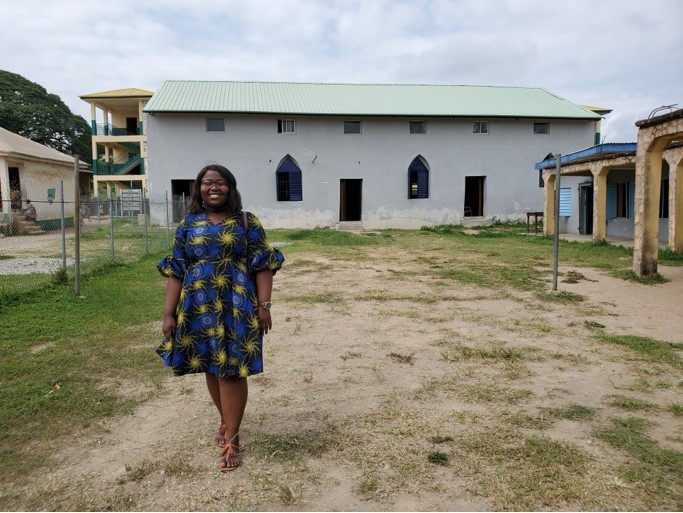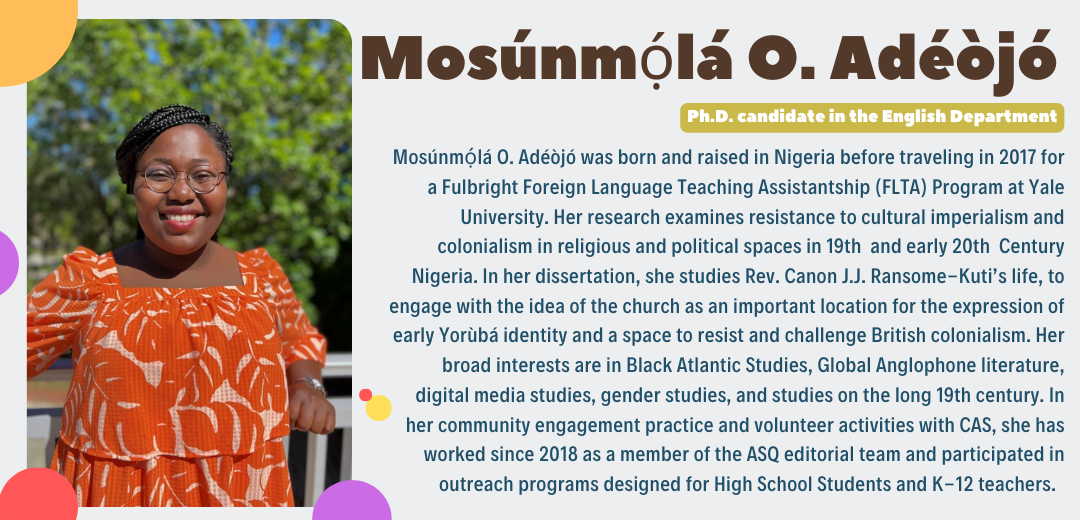Mosúnmọ́lá O. Adéòjó was born and raised in Nigeria before traveling in 2017 for a Fulbright Foreign Language Teaching Assistantship (FLTA) Program at Yale University. She is currently a Ph.D. candidate in the English department at the University of Florida. Her research examines resistance to cultural imperialism and colonialism in religious and political spaces in 19th and early 20th Century Nigeria. In her dissertation, she studies Rev. Canon J.J. Ransome-Kuti’s life, to engage with the idea of the church as an important location for the expression of early Yorùbá identity and a space to resist and challenge British colonialism. Her broad interests are in Black Atlantic Studies, Global Anglophone literature, Digital Media Studies, Gender Studies, and Studies of the 19th century. In her community engagement practice and volunteer activities with CAS, she has worked since 2018 as a member of the ASQ editorial team and participated in outreach programs designed for High School Students and K-12 teachers. She has also given presentations on African literature, Yoruba culture, and the Black diaspora at Eastside High School and the Institute for Learning in Retirement. Mosunmola hopes to continue sharing Yoruba culture and teaching African literature in her research, teaching, and community engagement.
 In her current work, Mosunmola undertakes an interdisciplinary study of Rev. Canon J.J. Ransome-Kuti, a Yorùbá Anglican minister who worked under the Church Missionary Society (CMS) in Abeokuta, Nigeria, as a teacher in the CMS institute in Lagos from 1880 to 1930, when he died as a reverend Canon. She focuses on the hymns he composed and recorded, the archival traces of his trips to England manifest in photographs and newspaper articles, and the digitized memory of his contributions to discuss the religious values and indigenous ethos that shaped his understanding and expression of Christianity in the Yorùbá Anglican church. Her research follows scholarship on the contributions of African missionaries to Christian indigenization, decolonial activism, and the intellectual history of Africa. Through her work, she hopes to shed light on how Africans stamped their presence and agency in colonial institutions.
In her current work, Mosunmola undertakes an interdisciplinary study of Rev. Canon J.J. Ransome-Kuti, a Yorùbá Anglican minister who worked under the Church Missionary Society (CMS) in Abeokuta, Nigeria, as a teacher in the CMS institute in Lagos from 1880 to 1930, when he died as a reverend Canon. She focuses on the hymns he composed and recorded, the archival traces of his trips to England manifest in photographs and newspaper articles, and the digitized memory of his contributions to discuss the religious values and indigenous ethos that shaped his understanding and expression of Christianity in the Yorùbá Anglican church. Her research follows scholarship on the contributions of African missionaries to Christian indigenization, decolonial activism, and the intellectual history of Africa. Through her work, she hopes to shed light on how Africans stamped their presence and agency in colonial institutions.
In the nearest future, Mosunmola hopes to be a public-facing professor working at a University or in an African/Africana Studies Center.
